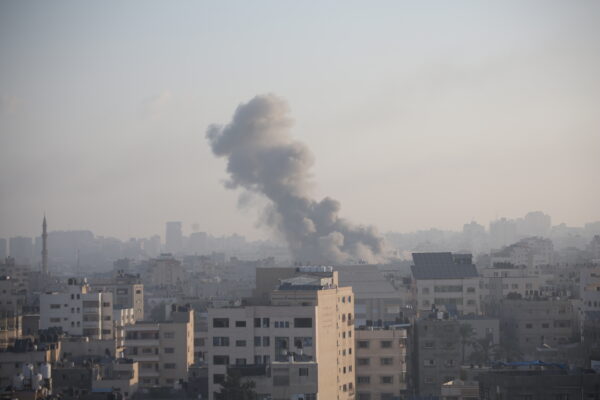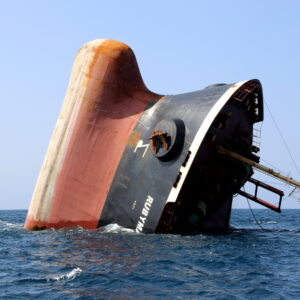
The Hamas attack and Israel's retaliation will have a huge impact on families directly in the firing line, as well as those in the wider Middle East and banks serving the region.
Fifty years ago, the Yom Kippur War caught the world by surprise. It left thousands of Israelis and Arabs dead, led to a major financial crisis due to an oil embargo and further widened the cleft between two blocs looking to dominate world markets and political systems.
Five decades later, some of today’s players and tactics are different. The atrocities leading to Israeli retaliation have been carried out by Hamas, a relatively new political and military actor. The Egyptians and Saudis, once making up two fighting units of a vast Arab-led coalition of armies and expeditionary forces, are now closer to Israel politically, if culturally aligned with the Palestinians.
But much of the story is eerily familiar to those of us who recall how the existential Middle East crisis of 1973 dominated TV screens, financial markets and chatter on Europe’s streets and playgrounds. Moreover, with US support of Israel largely unwavering over the decades, today’s backing of Hamas by Russian political commentators echoes the Soviet Union’s Arab-friendly foreign policy during the Cold War.
Three priorities for banks
For banks, investment managers and family offices serving the volatile region – home to wealthy Israeli and Arab clients, as well as poverty-stricken masses in the perpetually-blockaded Gaza Strip – three connected priorities are emerging.
Firstly, investment firms must support families of Israeli victims of unprecedently ferocious terrorist attacks, including massacres of civilians as well as military personnel. They must also help Palestinian families caught in a mounting humanitarian crisis on the Gaza Strip, under siege from the Israeli Defence Forces.
Secondly, regional investors will look to these banks to help minimise risks. Many have family memories of portfolios and businesses ravaged by previous conflagrations. Unfortunately, global banks did not cover themselves in glory following Russia’s invasion of Ukraine. Most made short-sighted predictions of limited market impact. Investment calls on the Middle East today sound remarkably similar.
Thirdly, it is vital to track changing geopolitical patterns and position resources to help revive flagging fortunes of both clients and regional economies.
Financial fortunes
In addition to devastating human cost, the conflict will damage fortunes of financial players, settling into relatively stable income streams from the region. Multi-family offices including London & Capital and Stanhope Capital, and banks such as Julius Baer, HSBC and Citi are particularly active. Some have enjoyed healthy relationships with the lucrative cohort of Israeli digital entrepreneurs. Others prospered from improving fortunes of the Arabian Gulf’s wealthy families, instrumental in liberalising socially conservative societies.
Arab and Israeli bankers are “in shock”, says one seasoned regional observer. “None of them saw this coming. They have seen situations like this before, yet never of this gravity.”

Reaching out to families directly affected, bankers are wary of upsetting sensitivities during this inflection point in an emotionally and physically traumatic conflict. US bank JP Morgan has put “non-essential” social media and marketing messages on hold, fearing they appear frivolous to Israeli clients.
All firms active in the Middle East should be “speaking with affected colleagues and staff and then turning attention to potentially affected clients and families”, says Iain Tait, head of the private investment office at London & Capital.
While financial factors “feel insignificant in the midst of such human horror and catastrophe”, historical “flight to safety” behaviour is expected from risk markets. According to London & Capital, this could include oil spiking, dollar strengthening, equities weakening – especially non US and non-core stocks – and solid government and investment grade bonds firming up.
Brent crude prices surged after the Hamas attack on Israel, with rising oil costs inflaming inflation worries and investor concerns mounting of restricted regional energy supplies, should Iran be drawn into the conflict.
“Unsurprisingly, more regionally affected emerging markets will suffer disproportionately,” says Mr Tait, with markets unable to adjust to a variety of potential outcomes. “The Hamas invasion of southern Israel over the weekend is an eruption of an ongoing regional conflict and humanitarian crisis which has the potential to expand into a prolonged conflict that historically has been a headwind for global equity markets,” says Norman Villamin, group chief strategist at Swiss wealth manager Union Bancaire Privée (UBP).
While UBP’s study of the impact of geopolitical conflicts on the S&P 500 index going back to 1940 – including coups, assassinations, terrorist events and cross-border wars – suggests modest, short-term impact, it is important to take into account the type and duration of the event. Prolonged military conflicts, drawing in several nations, have a greater and longer-term impact on markets than domestic terrorist events, suggests UBP.
This conflict fits the latter category, especially if regional escalation involves Lebanon, Egypt and Iran. “The risk that the largest incursion into Israel since 1973 transforms from a localised event to one that is prolonged and engulfs a wider range of nations should be among the key concerns for investors,” confirms Mr Villamin.
Moreover, a prolonged war has potential to trigger a renewed supply shock for global energy markets. This could unwittingly create a refuge for the region’s investors, concerned by oil price volatility.
“With energy equities historically cheap on an absolute basis and relative to the broader market, the sector may offer a safe haven amid the geopolitical uncertainty introduced over the weekend,” says Mr Villamin.
Saudi détente on hold
The attacks are a blow to Saudi Arabia’s long-planned rebrand. Reforms have encompassed women driving and occupying senior corporate positions. Arabian Gulf wealth management has enjoyed a “remarkable renaissance” with leading Western executives joining regional banks keen to boost their cross-border footprint, says a prominent recruitment consultant. This positive regional trend has depended on improving relations with Israel, a sworn enemy during the 1970s military confrontations. But a prolonged conflict involving Iran could imperil reproachment.
“The détente between Saudi Arabia and Israel is now on indefinite hold,” says Kim Cornwall, a former Gulf banker with Société Générale, now training senior relationship and portfolio managers across the region. “The Saudis are shocked and this puts them in a difficult position – though in secret, they would like to see the back of Hamas.”
Bankers mention “Iranian fingerprints” over the attacks, backed by close links with Russia to create a “worrisome combination”. But they caution making too many assumptions at an early stage, recalling ill-fated US decisions to attack Iraq and Afghanistan in the aftermath of 9/11.
Analysts, nevertheless, expect likely ramifications for Israel-Iran, Saudi Arabia-Israel and US-Saudi relations.
“Hamas is backed by Iran and the latter is attempting to sabotage the recent normalisation of relations between Saudi Arabia and Israel. This normalisation poses significant threats to Iran and could have potentially extended into regional security agreements with the involvement of the US. This may have left Iran isolated in the region,” suggests Anna Rosenberg, head of geopolitics at the Amundi Research Institute.
“Iran has significant leverage over the radical militant groups surrounding Israel, and the attack by Hamas was very likely supported by Iran, with the ultimate goals of making a Saudi-Israel rapprochement harder and reminding the Saudis of the power Iran wields in the region.”
Both Hamas and Israeli prime minister Benyamin Netanyahu also have an interest in shoring up shaky domestic political credentials. Mr Netanyahu faces significant domestic backlash given the security failure, believes Ms Rosenberg. This increases the odds of him acting with little restraint, as his is already weakened by corruption allegations and mass demonstrations against his authoritarian leadership.
He was hoping his recently announced “dramatic breakthrough” in relations with Saudi Arabia would provide the “security” he craves. Such an imposed deal would be anathema to an increasingly militant Hamas. Mr Netanyahu’s role in expanding Israeli settlements in the occupied West Bank, illegal under international law and contrary to UN plans for a two-state solution, mean any serious direct peace talks with Palestinians under his leadership are unlikely.
So what happens next, with both parties apparently committed to escalating the conflict? Every time prisoner swaps are discussed – as they will inevitably be as pressure mounts for Hamas to release Israeli hostages – the question of Marwan Barghouti’s possible accession to the Palestinian leadership will no doubt resurface. A key figurehead of the first and second Palestinian intifadas, Mr Barghouti is one of few figures strong, charismatic and experienced enough to unite Palestinian factions and lead negotiations for the Arab side. He is now serving his 22nd year in an Israeli jail.
Yet Yasser Arafat and Ehud Barak, respective leaders of the Palestinians and Israel, were unable to agree a settlement at the turn of the millennium after 10 years of negotiation, despite the backing of US president Bill Clinton.
Writing in a seminal pamphlet outlining the parameters of ‘The Jewish state’ at the end of the 19th century, the father of modern political Zionism and promoter of Jewish immigration to Palestine, Theodor Herzl, predicted a Middle Eastern Utopia where Jews “will die peacefully in our own homes”. Almost 130 years later, the state he envisaged is living through its darkest days.



